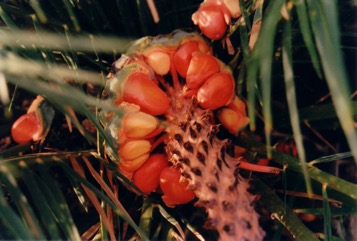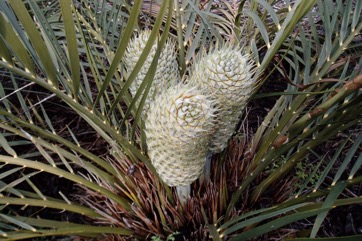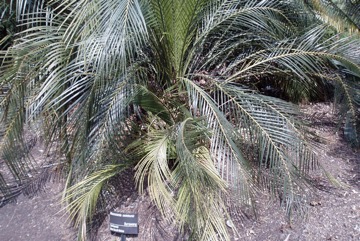Burrawang

It is a warm temperate climate plant. It tends to grow on sand and gravel in coastal warm temperate areas in Eastern Australia. It can tolerate frost. It suits hardiness zones 9-11. Melbourne Botanical Gardens. Arboretum Tasmania.
Synonyms
- Zamia spiralis
Edible Portion
- Seeds kernel, Nuts, Caution
Where does Burrawang grow?
Found in: Australia, Tasmania
Notes: There are about 38 Macrozamia species. It is endemic to Australia.
Growing Burrawang
Cultivation: Plants are grown from seed.
Edible Uses: CAUTION The seeds are poisonous without proper processing. The seed kernels are eaten after proper processing. The treatment includes leaching and aging. They are made into a kind of bread.
Production: It is slow growing. Seedlings take some years to develop into mature plants.
Nutrition Info
per 100g edible portion| Edible Part | Energy (kcal) | Protein (g) | Iron (mg) | Vitamin A (ug) | Vitamin c (mg) | Zinc (mg) | % Water |
|---|---|---|---|---|---|---|---|
| Nuts | 87 | 7.3 | 5.6 | - | - | 0.1 | 57.2 |
Burrawang Photos




References
Blomberry, A.M., 1979, Australian Native Plants. Angus and Robertson p 194
Bodkin, F., 1991, Encyclopedia Botanica. Cornstalk publishing, p 665
Brickell, C. (Ed.), 1999, The Royal Horticultural Society A-Z Encyclopedia of Garden Plants. Convent Garden Books. p 643
Caton, J.M. & Hardwick, R. J., 2016, Field Guide to Useful Native Plants from Temperate Australia. Harbour Publishing House. p 264
Cherikoff V. & Isaacs, J., The Bush Food Handbook. How to gather, grow, process and cook Australian Wild Foods. Ti Tree Press, Australia p 138, 195, 200
Cronin, L., 1989, The Concise Australian Flora. Reed. p 259
Cundall, P., (ed.), 2004, Gardening Australia: flora: the gardener's bible. ABC Books. p 850
Elliot, W.R., & Jones, D.L., 1993, Encyclopedia of Australian Plants suitable for cultivation. Vol 6. Lothian. p 273
Etherington, K., & Imwold, D., (Eds), 2001, Botanica's Trees & Shrubs. The illustrated A-Z of over 8500 trees and shrubs. Random House, Australia. p 453
Facciola, S., 1998, Cornucopia 2: a Source Book of Edible Plants. Kampong Publications, p 247
Greig, D., 1996, Flowering Natives for Home Gardens. Angus & Robertson. p 254
Hardwick, R.J., 2000, Nature's Larder. A Field Guide to the Native Food Plants of the NSW South Coast. Homosapien Books. p 23
Hibbert, M., 2002, The Aussie Plant Finder 2002, Florilegium. p 188
Jones, D.L., 2000, Cycads of the world. Reed New Holland. p 234
Lazarides, M. & Hince, B., 1993, Handbook of Economic Plants of Australia, CSIRO. p 155
Lord, E.E., & Willis, J.H., 1999, Shrubs and Trees for Australian gardens. Lothian. p 97
Marinelli, J. (Ed), 2004, Plant. DK. p 376
Proc. Linn. Soc. New South Wales 84:98. 1959